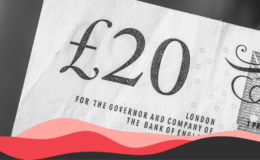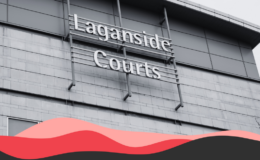- Several claims have been made about devastating effects of the Protocol on the cost of living in NI
- Claims such as the Protocol “is adding 27% additional costs to everything” compared with Great Britain are not supported by evidence
- Local people do pay more for some items than those in GB – but overall we pay less
- Some transport firms could have seen significant rises in costs, and this could affect local prices, but any cost increase is likely to vary from firm to firm
In recent weeks, many claims have been made about the Protocol, and about how much it is raising costs for people and families in Northern Ireland.
On May 9, North Antrim DUP MP Ian Paisley Jr. told the Nolan Show on BBC Radio Ulster:
“The Protocol is adding 27% additional costs to everything in Northern Ireland, because of the additional costs associated with the Protocol. The cost of transporting things over and the added cost the Protocol adds to transport. If you think costs of living are high in GB mainland, for people in Northern Ireland, add an additional 27%. Not because of higher energy costs but because of the Protocol.”
This followed a similar claim made by Rev. Mervyn Gibson, the Orange Order’s Grand Secretary, on Radio Ulster’s show Talkback on April 26:
“… my experience from talking with people, from talking with economists is goods coming in here are raised 27% because of a direct result of the protocol coming from GB.”
During the BBC NI Leaders’ Debate, ahead of the May 5 Assembly election, DUP leader Sir Jeffrey Donaldson said:
“As a direct result of the increased cost in bringing food products from Great Britain to Northern Ireland due to the Protocol, consumers in Northern Ireland are now paying on average 4% more per item than they are in Great Britain at the moment.”
Mr Donaldson also stated that NI shoppers were paying 8% more for dairy products and 19% more for chilled convenience goods than people in GB.
FactCheckNI sent several questions to the DUP, asking for comment on these claims. We have received no reply.
So, what’s the story?
What is the Protocol?
The NI Protocol is part of the Brexit Withdrawal Agreement between the UK and the EU.
It leaves Northern Ireland within the European Union Internal Market (the Single Market) for goods, meaning NI’s regulatory standards for goods are aligned with the EU.
In practical terms, the Protocol places a goods border between NI and Great Britain, and has led to checks being required for goods travelling between NI and GB.
However, the Protocol has yet to be fully implemented – and it does not apply to services.
Examining the claims – “27% on everything”
Ian Paisley Jr claimed:
“The Protocol is adding 27% additional costs to everything in Northern Ireland, because of the additional costs associated with the Protocol. The cost of transporting things over and the added cost the Protocol adds to transport. If you think costs of living are high in GB mainland, for people in Northern Ireland, add an additional 27%. Not because of higher energy costs but because of the Protocol.”
It’s worthwhile unpicking what this means. And that isn’t easy.
Mr Paisley said that the Protocol “is adding 27% additional costs to everything in Northern Ireland”. This is a huge statement, asserting that overall costs are 27% higher thanks to the Protocol.
He then mentioned transport. We’ll discuss this later. However, he doesn’t say that he’s only talking about transport – indeed, his next comments appear to pivot away from that: “If you think costs of living are high in GB mainland, for people in Northern Ireland, add an additional 27%. Not because of higher energy costs but because of the Protocol.”
He claims that NI’s cost of living spike is much worse than consumer inflation in the UK – by that same figure of 27%. This is very different from Mr Paisley’s first 27% claim, because this suggests that the rise in costs is up by 27% – whereas the initial claim is that costs per se have spiked by that amount.
The MP then says this isn’t to do with energy but because of the Protocol.
Fact-checking garbled speech is difficult. Let’s break it down.
Step by step
Consider the claim that the Protocol “is adding 27% additional costs to everything in Northern Ireland”.
Taken at face value, this doesn’t make sense. The Protocol only applies to goods, not services. It is not in a position to add “27% additional costs to everything”.
What if only goods are considered? The Protocol is yet to be fully implemented, meaning it is yet to apply to certain goods. Furthermore, not everything sold in Northern Ireland originates from or travels through GB, meaning the Protocol would not apply to those in any case.
The only way this claim might be true is if the price of everything was raised by 27% or more due to indirect effects from the Protocol. There is currently no evidence that this is the case.
Comprehensive inflation figures for Northern Ireland would really help to determine this, but those are not collated. The Office for National Statistics (ONS) produces CPI and RPI figures for the whole of the UK. Neither they nor the Northern Ireland Statistics and Research Agency (NISRA) collate figures for NI alone.
For the same reasons, the claim made by Rev. Mervyn Gibson is also inaccurate.
Examining the claims – groceries
What about the claims made by Sir Jeffrey Donaldson?
His assertions were much more narrow, and focused on groceries.
He claimed that prices for dairy products had risen 8% and chilled convenience goods 19% as a “direct result of the Protocol”. He added that “consumers in Northern Ireland are now paying 4% more per item than they are in Great Britain”.
This, at least, has the potential to make some sense. Supermarket supply chains can involve plenty of GB-NI transit. Several supermarkets have adjusted their supply chains following Brexit but Marks & Spencer, for instance, continues to rely heavily on east-west movement of goods.
He also provided a source for these claims, a report from analysts Kantar commissioned by the Department for the Economy.
This report does state that the “average price per pack for dairy products in NI was 8% higher than in GB and the average price per pack for chilled convenience goods was 19% higher in NI”.
This supports two of Sir Jeffrey’s claims. The report, however, undermines the third and most notable of his assertions. He claimed consumers in NI are paying 4% more per item than people in GB, but the Kantar analysis says that “the average total grocery price in GB was 8% higher than in NI.”
Context
The Kantar comparison is not based on exact product matches between GB and NI. It does, however, compare the prices of similar goods found in people’s shopping baskets.
It is also based on only one month’s data using a small sample size, as the report itself admits: “The data are not official statistics, but they can provide some useful insight into the grocery market at an aggregate level. The panel size for NI is small and the NI figures are calculated from a sample of 650 households. The GB figures are calculated from a sample of 30,000 households.”
The report’s findings are also at odds with official data. Figures from the Office of National Statistics (ONS) in fact suggest that:
- the price of chilled pizzas and quiches have been and remain lower in Northern Ireland than in Great Britain
- the price of an individual meat pie has generally been slightly higher but is no more so since the Protocol came into effect
- the price of ready meals has risen slightly faster in Northern Ireland than in Great Britain, but only marginally (by nothing like 19%)
Earlier ONS data from the Office of National Statistics shows that, in January 2020 – i.e. before the UK had left the EU – the price of two pints of milk was 99p in Northern Ireland and 83p in Great Britain. That gap has been fairly consistent since August 2020 (i.e. before the Protocol came into effect).
For cheese, the figures are less consistent but similar. However, even these figures run only to early 2022.
Altogether this makes it difficult to blame the Protocol for the fact that NI’s dairy prices are higher than those across the Irish Sea.
Response, part one
We put several questions to the DUP about the claims made by Mr Paisley Jr. and Mr Donaldson. They responded to both sets of questions. We’ll look at each set in turn. First up, Mr Paisley.
The DUP said he was referring specifically “to the cost of moving goods from GB to NI”.
That’s not what he said, as discussed above. At the same time, maybe he was simply unclear. What he said, written down, is a bit of a mess. Should an elected representative choose their words carefully? Ideally yes – but he’s just a human, and this all happened on live radio.
So, maybe he misspoke. Let’s take that clarification at face value and focus on haulage costs.
A DUP spokesperson told FactCheckNI:
“The 27% figure was based on research conducted and provided by the Road Haulage Association, a trade body that represents the majority of Northern Ireland’s hauliers who service the GB to NI supply chain. It related to increased costs in the sector in 2021 for moving goods from GB to NI, which inevitably will be passed on to retailers and consumers in Northern Ireland even if they are absorbed for a time. The RHA has released updated estimates to local media outlets.”
The party pointed to statements made by the RHA in local media, such as this News Letter article, featuring quotes like:
‘‘The current estimated extra costs to the logistics sector are a conservative 30-35% which will increase considerably when the current easements end or the protocol is fully implemented with the most vulnerable in society suffering.”
Transport sector
FactCheckNI contacted the RHA and they have yet to respond. However, they have spoken out against the effects of the Protocol on several occasions, such as in this press release from May 26.
We also spoke to representatives from Logistics UK, who said that there has been no full survey carried out with the industry in relation to costs associated with NI Protocol compliance, and that the experience of small numbers of haulage firms are not necessarily representative of any wider trends because different companies may transport significantly different types of goods and costs will not necessarily be spread evenly across those different types.
They added that, in the absence of a full industry survey, the Transport Exchange Group’s price index is a useful proxy measure for GB-NI and UK-EU haulage rates. – adding that it shows that UK Haulage rates in April 2022 were 14.0% more than April 2019, and 5.7% more than April 2021.
The spokesperson also explained that higher haulage costs over this period has also been driven by increased fuel, ferry and labour costs.
This is a complicated picture, with several factors at play.
However, it is at least plausible that some haulage firms have seen costs rise by 27% or more, with the Protocol as a major factor in this rise.
At the same time, this might not be representative, in general, of increased transport costs due to the Protocol.
Regardless, this is not the same as the Protocol “adding 27% additional costs to everything in Northern Ireland”.
Response, part two
When it comes to Mr Donaldson’s claims, the DUP again referred to the Kantar research commissioned by the Department for the Economy.
They said: “Kantar Price Data published by the Department for the Economy confirmed that the average cost of the following food product categories (per pack) in Northern Ireland was 4.8% higher than in Great Britain.”
They also sent this table in an email to FactCheckNI:

The Kantar research found that grocery prices in GB are, on average, 8% higher than they are in NI. They reached this conclusion by looking at the prices of a wide range of groceries, considering a ‘standard’ basket of food that a family might buy, and comparing the overall price.
What the DUP has done is select a few of the food categories involved in the Kantar research, glued a few together and said that, if you only factor those ones in (ignoring some others), then it looks like prices are higher here – despite the fact the report they are quoting says the opposite.
Cherry picking facts to suit a narrative is one of the mainstays of the modern age of mis- and dis-information. Rarely, however, is it quite this brazen.
In a recent Written Question in the Assembly, Alliance MLA Paula Bradshaw asked the Economy Minister Gordon Lyons “what information his Department holds on the difference in overall grocery prices between Northern Ireland and Great Britain.”
The only information he pointed to in his response, from June 8, was the research from Kantar.
Inconclusive
This article examines a series of claims, some of which are plainly inaccurate while some look at least arguably accurate, based on available evidence.
However, the claims that are arguably true are the smallest claims this article examines, and the evidence for them is largely based on a report that gave a price snapshot for a single month and relied on a small sample size. Moreover, those claims are in some conflict with ONS data.
It is difficult to examine the full effect of the Protocol on consumer prices in Northern Ireland, for a number of reasons.
If the Protocol is driving up costs, this would represent an inflationary pressure but detailed, specific, comprehensive inflationary figures for Northern Ireland are not collected.
Inflation is also running rampant around the world. This is due in large part to massive disruptions; not least the COVID-19 pandemic and the war in Ukraine.
They represent two world-altering events and the timing of both makes counterfactual information to measure the effects of the Protocol on NI difficult to pin down readily.
In terms of haulage costs specifically, costs for the industry as a whole are rising although there is an absence of comprehensive data that identifies how much of an effect each of the different factors is having.
It is entirely possible that some firms have seen costs rise by more than a quarter, and that the Protocol is a major factor in this, but that may not be representative of the extent of the Protocol’s costs in general.
On the other hand, the Protocol is yet to be fully implemented and, were that to happen, costs associated with the Protocol could rise further.




